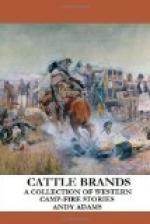After breakfast was over we smoked and yarned. It would be two-hour guards for the day, keeping an eye on the prisoners and stock, only one man required; so we would all get plenty of sleep. Conajo had the first guard after breakfast. “I remember once,” said Sergeant Smoky, as he crushed a pipe of twist with the heel of his hand, “we were camped out on the ‘Sunset’ railway. I was a corporal at the time. There came a message one day to our captain, to send a man up West on that line to take charge of a murderer. The result was, I was sent by the first train to this point. When I arrived I found that an Irishman had killed a Chinaman. It was on the railroad, at a bridge construction camp, that the fracas took place. There were something like a hundred employees at the camp, and they ran their own boarding-tent. They had a Chinese cook at this camp; in fact, quite a number of Chinese were employed at common labor on the road.
“Some cavalryman, it was thought, in passing up and down from Fort Stockton to points on the river, had lost his sabre, and one of this bridge gang had found it. When it was brought into camp no one would have the old corn-cutter; but this Irishman took a shine to it, having once been a soldier himself. The result was, it was presented to him. He ground it up like a machette, and took great pride in giving exhibitions with it. He was an old man now, the storekeeper for the iron supplies, a kind of trusty job. The old sabre renewed his youth to a certain extent, for he used it in self-defense shortly afterwards. This Erin-go-bragh—his name was McKay, I think—was in the habit now and then of stealing a pie from the cook, and taking it into his own tent and eating it there. The Chink kept missing his pies, and got a helper to spy out the offender. The result was they caught the old man red-handed in the act. The Chink armed himself with the biggest butcher-knife he had and went on the warpath. He found the old fellow sitting in his storeroom contentedly eating the pie. The old man had his eyes on the cook, and saw the knife just in time to jump behind some kegs of nuts and bolts. The Chink followed him with murder in his eye, and as the old man ran out of the tent he picked up the old sabre. Once clear of the tent he turned and faced him, made only one pass, and cut his head off as though he were beheading a chicken. They hadn’t yet buried the Chinaman when I got there. I’m willing to testify it was an artistic job. They turned the old man over to me, and I took him down to the next station, where an old alcalde lived,—Roy Bean by name. This old judge was known as ’Law west of the Pecos,’ as he generally construed the law to suit his own opinion of the offense. He wasn’t even strong on testimony. He was a ranchman at this time, so when I presented my prisoner he only said, ’Killed a Chinese, did he? Well, I ain’t got time to try the case to-day. Cattle suffering for water, and three windmills out




